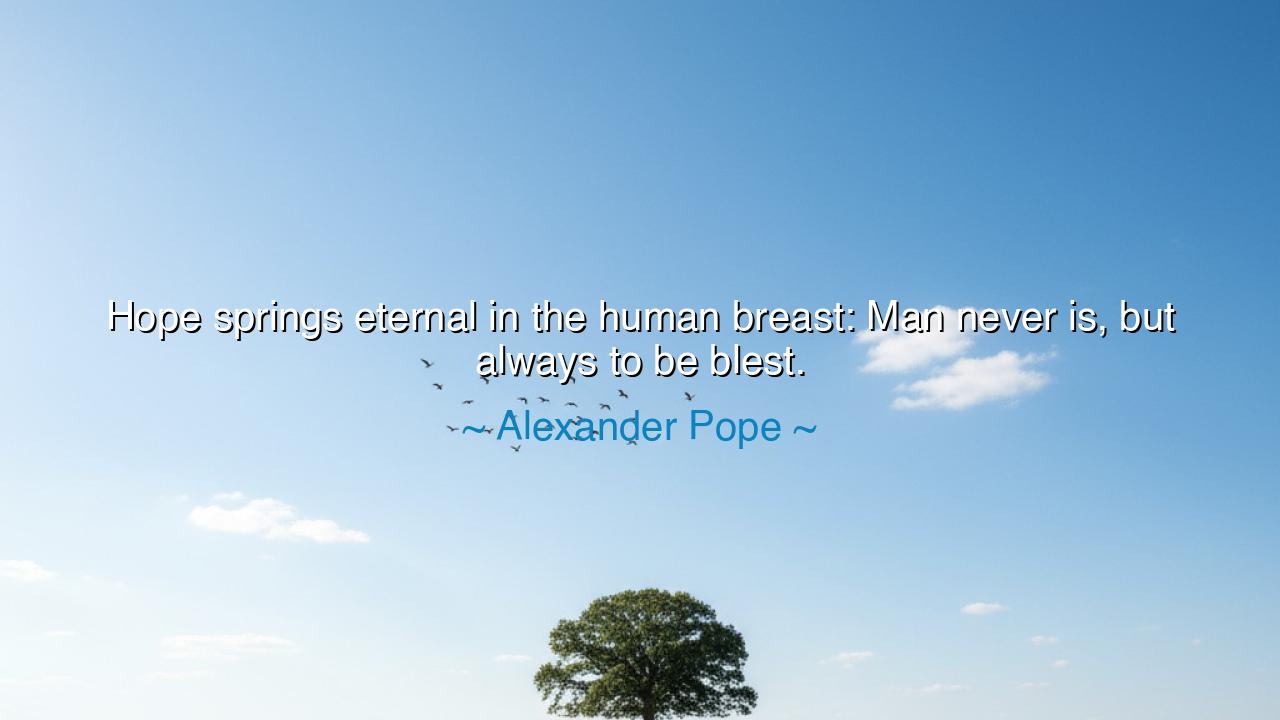
Hope springs eternal in the human breast: Man never is, but






The immortal words of Alexander Pope—“Hope springs eternal in the human breast: Man never is, but always to be blest”—flow like a hymn from the soul of humanity. They come from his great philosophical poem, An Essay on Man, written in the early eighteenth century, when the poet sought to understand the order of the universe and the place of mankind within it. In these lines, Pope reveals both the glory and the restlessness of the human spirit. He tells us that hope, like an ever-flowing spring, rises ceaselessly within the heart, even in despair; and yet, he warns us that man’s longing for perfect happiness is endless—that we are forever reaching toward blessings just beyond our grasp.
To say that hope springs eternal in the human breast is to recognize that it is woven into our very nature to believe in tomorrow, even when today has failed us. Hope is the secret fire that refuses to die, no matter how cold the night becomes. It has carried the human race through famine, war, exile, and sorrow. From the first dawn to the present age, hope has been the soul’s greatest inheritance—the divine spark that whispers, “there is still more to come.” And yet, Pope joins this with a sobering truth: “Man never is, but always to be blest.” He means that humanity is rarely content in the moment; our joy is ever postponed to the future, our peace always pursued, never possessed.
This is not despair, but revelation. For Pope understood that our incompleteness is both our suffering and our strength. It drives us to build, to seek, to dream. It is what compels us to create art, discover knowledge, and search for meaning beyond the visible world. Hope is not a flaw—it is the evidence that we are meant for more than what this world can give. As long as man hopes, he is alive; when hope dies, he perishes in spirit. Thus, the poet’s line becomes both a lament and a celebration: we are never fully satisfied, yet that eternal yearning is what makes us divine.
History itself sings the same refrain. Consider the story of Ernest Shackleton, the Antarctic explorer who, when his ship Endurance was trapped and crushed by the ice, led his crew through months of freezing wilderness and perilous seas. Against every rational expectation, he kept their hope alive. He told his men, “We must go on. A man must shape his own destiny.” And so they did—every one of them survived. In that bitter, frozen world, Shackleton’s unbroken faith in the possibility of rescue became the embodiment of Pope’s words. Even in desolation, hope sprang eternal, and from it came endurance, courage, and life itself.
Pope’s insight also reflects a timeless paradox: that hope and dissatisfaction walk hand in hand. We are creatures of desire, forever striving for perfection in an imperfect world. We build cities, seek knowledge, pursue love and virtue, yet still feel the ache of something missing. It is this hunger that lifts us above the beasts, for only humanity can dream of heaven while standing in the dust. To be “always to be blest” is to live in motion—to walk forever toward a horizon that recedes but never vanishes. And perhaps this, too, is the secret of our greatness.
Yet the poet’s wisdom is not meant to leave us longing without peace. For though man “never is,” Pope invites us to recognize the quiet joy of the journey itself. The blessing we chase may not be found in arrival, but in the striving, the loving, the enduring. Each act of kindness, each dream born from darkness, each attempt to build something better—these are the sacred fruits of eternal hope. To hope is to participate in creation itself, to shape a world that is not yet but could be.
Let this, then, be the teaching for all who live under the burden and the blessing of hope: cherish the spring within you. Let it flow freely, but do not let it make you blind to the beauty already around you. Hope not only for the distant good, but also for the next breath, the next act of grace, the next chance to love. When your heart aches for what is not yet, remember that even that ache is proof of life divine.
For in truth, hope is both the gift and the trial of being human. It drives us to climb mountains that never end, yet gives us the strength to keep ascending. It makes us restless, but also radiant. And so long as hope springs in the human breast, humanity will never be lost. Though man “never is,” he is ever becoming—and in that becoming, in that ceaseless reaching for the light, he is already, in a mysterious way, blessed.






AAdministratorAdministrator
Welcome, honored guests. Please leave a comment, we will respond soon